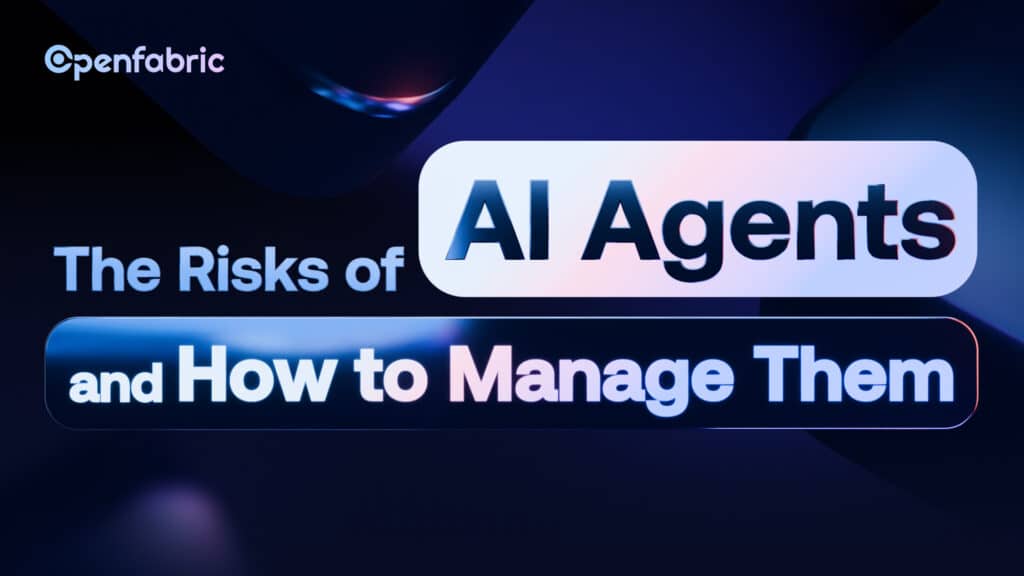
December 20, 2024 5 minutes read
The Risks of AI Agents and How to Manage Them

AI agents are fast becoming a household name all around the world as more industries are beginning to adopt it. In one of our previous posts, where we explored the transformative applications of AI agents, we saw that by 2025 there would be a massive increase in the use of AI agents. As a promising innovation, their uses will continue to expand across various verticals as the years go by. However, with this increasing use, there are associated risks of AI agents that must be handled properly in order to fully maximise their potential.
According to a study by Deloitte, half of the companies that use GenAI will have launched an AI agent by the year 2027. These AI agents will have the ability to act as virtual smart assistants that perform complex tasks with little or no human supervision. While this development has immense advantage, there are also risks of AI agents that may affect how well they are used. However, these risks are not to discourage the use of AI agents. On the other hand, they are so that we can improve the efficiency of AI agents and help them serve us better.
As such, in this blog post, we will explore the risks of AI agents and come up with creative solutions that we could use to address these risks.
Let’s dive right in!
The Risks of AI Agents
AI agents easily integrate into the operations of a business. Thereby increasing workplace efficiency and productivity. Even in our homes, AI agents act as intelligent smart assistants that automate routine tasks in our daily lives.
It is safe to say that there are numerous benefits of using AI agents. Unfortunately, alongside these benefits, there are risks that are associated with the use of AI agents. Let’s look at some of the risks of AI agents.
Cybersecurity risks
Any tool that has access to user private data is vulnerable to cyber attacks. Unfortunately, AI agents are one of such tools. AI agents use a lot of private data to operate optimally. Cybersecurity attacks on AI agents can lead to tempering and theft of sensitive data.
AI agents, in addition to Generative AI, use large language models (LLMs) to enable AI agents to perform intelligent and complex tasks with no human supervision. LLMs don’t have the ability to provide user specific access rights to information. Therefore, they are a weak link and their vulnerability makes them targets for cybersecurity attacks.
Lack of transparency
The autonomousity of AI agents makes their transparency questionable. Experts have raised ethical concerns in regards to their mode of operation which is vague. This lack of transparency is one of the reasons that causes the mistrust and confusion people have with using AI agents.
Bias and discrimination
AI agents are subject to bias and discrimination. This is because they rely heavily on the data developers use to train them. However, this only occurs when the data used is biased and discriminatory.
This risk with AI agents is particularly grave in the application AI agents in facial recognition software for verification and security. This bias often leads to discrimination. For example, biased-trained AI agents might make discriminatory decisions regarding individuals of a particular demographic thus denying them of some opportunities. When it concerns issues of security, this bias can even be life threatening or lead to punishment of innocent individuals.
Dependence on data quality
The data used to train AI agents determines its performance. Usually, developers use high-quality data to train AI agents for them to make intelligent decisions. However, in a situation where the data is inaccurate or incomplete, the performance of these AI agents becomes suboptimal. The risks of AI agents that are suboptimal are numerous. It can be as simple as not performing the tasks for which it was designed to perform or have consequences that are unpredictable.
Regulatory and ethical risks
AI agents that don’t have comprehensive data governance frameworks expose individuals and businesses alike to regulatory and ethical challenges. In every country or region, there are certain regulations that govern how developers use and process personal data. For example, HIPAA has these regulations to protect patient data more effectively. These regulations control the use and accessibility of data.
However, AI agents use LLMs. LLMs indexes groups of data without user-specific access controls. By doing so, they can breach these data regulations that have been put in place to protect users’ data. Unauthorized access and use of personal data attracts heavy fines and legal repercussions.
How to manage these risks
The risks of AI agents reduce the trust individuals have for Artificial Intelligence. Therefore, management of these risks is our end goal smfor the full incorporation of AI agents in the running of our daily activities and businesses. The use of AI agents greatly improves efficiency and productivity individually and in a company. As such, it is important that we manage these risks and eliminate any lingering fear preventing us from fully exploring the benefits of AI agents.
Here are some ways to manage the risks of AI agents:
- Implement cybersecurity measures
As stated earlier, AI agents are exposed to a large amount of personal data. Therefore, there must be measures in place to protect them from cybersecurity attacks and data breaches. - Fix transparency issues
Improving the transparency of AI agents and keeping individuals in the decision making process of AI agents. This does not take away the autonomous nature of AI agents. However, it allows human experts to review decisions taken after they have been made. - Elimination of bias
Developers can mitigate bias and discrimination by training AI agents on data and with humans that are unbiased. - Use of high-quality data to train AI agents
Developers must also use high quality data train AI agents to prevent suboptimal performance. Using high-quality data eliminates technical risks and improves the performance of AI agents. - Strict compliance to governing regulations and ethics
First of all, regulatory bodies must establish strict ethical guidelines to protect human rights and privacy. Afterwards, developers must ensure that AI agents comply with these ethics and regulations before deploying them.
Conclusion
The risks of AI agents impair their effectiveness in the society. It also reduces the rate of adoption of Artificial Intelligence in the modern world. Fortunately, we can manage all these risks well. An understanding and management of these risks individuals and businesses put themselves in a position to fully enjoy the potential of AI agents.
As we move forward, we hope to eliminate these risks totally and live in a world where AI agents change the way we work.
For more updates and insights, visit our WEBSITE today!

